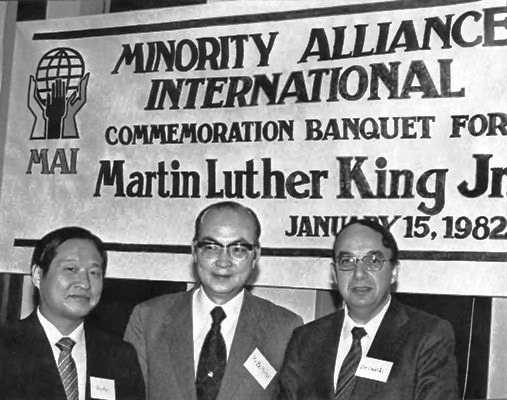![]()
The Words of the Johnson Family
|
|
The Words of the Johnson Family |

On January 15, 1982, the Minority Alliance International held a banquet honoring Dr. Martin Luther King, Jr. Opening the event, Col. Bo Hi Pak, Secretary-General of the new organization, proclaimed Reverend Moon's dedication to the "total eradication" of all forms of bigotry. He also said that the Minority Alliance International would begin with many new projects.
The idea for the Minority Alliance International was inspired by True Father on October 22, 1981, in a rally at New York City's Foley Square. Members and branch churches of the Unification Church worldwide will support the new alliance.
Held at the Time-Life Building in Manhattan, the banquet brought together more than 100 local civil rights activists to commemorate the 53rd anniversary of the birthday of Dr. King. Col. Pak called on the international audience of minority leaders to unite and carry on the same traditions as the late Dr. King. He also praised the leaders for their continued dedication to the "promised land," as envisioned by the slain civil rights leader.
In addition to honoring the life and work of Dr. King, this first Alliance event announced the 1982 "Martin Luther King, Jr. Awards" to local citizens. Dr. Mose Durst presented these awards to U.S. Congressman Charles Rangel, Bronx Borough President Stanley Simon, national talk show host Tony Brown, New York State Assemblyman Victor Robles, and Manhattan Council- man Luis Olmedo, for their willingness to "still march against the forces of religious and racial bigotry."
While calling the leaders "champions:' Dr. Durst cautioned that "the dream of Dr. King, that we could live as brothers and sisters in harmony, has yet to be realized." "Dr. King," he said, "represents the best of what this culture is, and if we cannot live up to the best, we will experience the worst:'
Dr. Benjamin Watkins, Mayor of Harlem, was Master of Ceremonies for the 120 invited guests, and he told the multinational, interracial gathering, "It seems as if the whole world is here! This is the way our friend Martin Luther King would have wanted it:' Music for the evening was provided by Alpha Cinco, a local Hispanic band, and Brother John Sellers, a protégé of the late Mahalia Jackson and an internationally famous gospel singer.
Councilman Olmedo commented, "This Alliance is a beautiful thing. It will help move things ahead." He also praised "whoever came up with the idea. It will grow and grow and bring justice throughout the world."
New York State Senator Joseph Galiber, who also was a special guest at the event, said, "Whenever we find people together in unity, it is a wonderful thing. This movement is good. It is a good mix -- black, white and yellow."
The United States Supreme Court upheld a landmark lower court decision to allow members of new religious groups to sue their parents and others who try to abduct and "deprogram" them. The January 18, 1982 decision should remove any doubts over whether U.S. civil rights laws protect against religious as well as racial discrimination.
The decision, in a case brought by our member Thomas Ward, now 33, is a significant recognition of the unconstitutionality of the so-called "deprogramming" activities and will help our members utilize federal courts and laws to prosecute those who obstruct their rights.
Tom filed a suit after his second experience with deprogramming; he was kidnapped while on his way back to the Unification Church in New York after a visit to his family over Thanksgiving, 1978. Held captive for 35 days in Virginia Beach, Virginia, and in and around Pittsburgh, Pennsylvania, Tom was subjected to physical and psychological abuse from his family members and others hired to break his religious faith.
The Fourth Circuit Court of Appeals had ruled last August that Tom's parents had conspired with 31 other people to deprive him of his civil rights. By declining to review the case, The U.S. Supreme Court upheld the lower court's ruling. In the past, courts often have given parents and the agents they hire a kind of "parental immunity" against suits for illegal actions, assuming that parents always act out of love for and in the best interests of the family member. In effect, the courts had been saying that it is impossible for family members to commit certain torts against other family members. "That's patently ridiculous:' said John E. Harrison, Tom's lawyer. "What you had was the incipient development of a bad law:' which, if unchecked, he speculated, could adversely affect other areas, such as laws relating to child abuse.
The Civil Rights Act of 1871, originally designed to stop Ku Klux Klan harassment of blacks in the South, became one of civil rights attorneys' most widely used tools, after being revived by a series of court decisions during the 1960's and 1970's. In 1971, the Supreme Court ruled that the 1871 act provides a federal remedy against private conspiracies motivated by "some racial, or perhaps otherwise class- based, invidiously discriminatory animus," but district court decisions often did not apply that remedy.
The recent Supreme Court decision has now clarified that the above clause can be used also against conspiracies motivated by religious hostility, although it did not settle any of the substantive issues involved in deprogramming cases, such as whether parents and their agents can claim that they acted out of love and affection for a family member as a justification to carry out what would otherwise be an illegal abduction. Although attorneys involved felt that this decision by itself probably would not immediately affect deprogrammers' activities, it should set a clearer standard for future court cases.